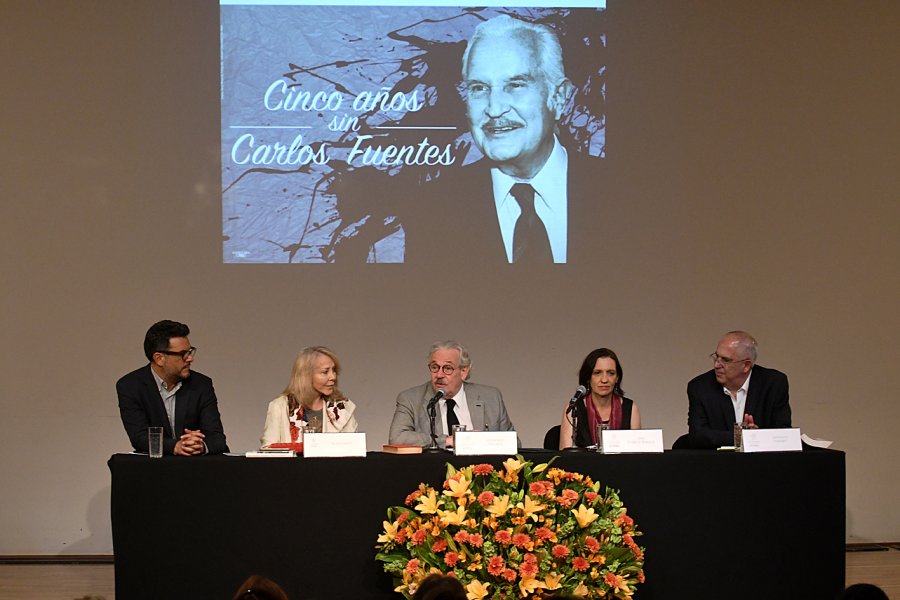Noticias
Tribute to Carlos Fuentes five years after his death
May 14, 2017Carlos Fuentes (Panama, November 11, 1928-Mexico City, May 15, 2012), the man who built with his pen new paths for Mexican literature, the author whose work portrayed Mexico as a territory where passions, magic, light and darkness are interwoven throughout the centuries, was remembered the afternoon of Sunday May 14th in the tribute, Five years without Carlos Fuentes.
With the presence of the writer’s widow, Silvia Lemus, three of Carlos Fuentes’s were commented by Gonzalo Celorio, Ana García Bergua and Antonio Saborit, as they celebrate anniversaries in 2017: A change of skin (50 years), Sacred zone (50 years) and Cristóbal Nonato (30 years).
The writer, essayist and member of the Mexican Academy of Language, Gonzalo Celorio opened the talk and said that the novel A change of skin (1967) written in Tonanzintla, New York and Paris, shows his need to embrace a style that goes from the historical to the ontological, using new narrative paths and structuring it as a large mural, like painted by a miniaturist.
Gonzalo Celorio reminded that the same year of A change of skin, Gabriel García Márquez published the great novel 100 years of solitude in 1967, showing an affinity with his Colombian colleague trying to construct a totalizing story that showed Latin American’s traits.
Also, there is another novel, Rayuela similar to A change of skin, because in them the theme of double is fundamental in the couples that appear and shows the otherness as a literary symbol, both in the realm of eroticism and in the impulses and whims of the characters.
“Many and very different readings have been given to this novel. Octavio Paz said that Fuentes’s works are like a hieroglyph. This novel is ambitious and urgent to fill a historical void and to fulfill what Alejo Campertier called the condition of the Latin American writer: to name things like Adam.
Narrator Ana García Bergua spoke of Sacred Zone, a novel also published in 1967, which she defined as a Carlos Fuentes’s non-minor work, published by Siglo XXI, and on the day of its presentation, some of its fragments were read by the Argentine short story writer Julio Cortázar (Brussels, Belgium, August 26, 1914 - Paris, France, February 12, 1984).
Garcia Bergua added that this is a novel of humiliated Oedipus that deals with filial love between a Telemaco who is in love with his mother, the great actress who can only see herself.
He reminded Carlos Fuentes's clear intention to make this novel read as a film, adding to the narration dissolutions, flashbacks and other techniques used by the cinema to construct a story with hints of nightmare or an unreal delirium in the environment that weaves the character, Claudia Nervo.
"The cinematographic mythology creates a first stage for this novel where, as In the most transparent region, they show a Mexico of splendor that makes of this book a work to review".
Cristóbal Nonato, a novel that turns 30 years old was described by Antonio Saborit as a work that shows the satire through the conformation of the family of the character of Christopher who has not yet been born, who says that the voice of history makes inaudible his own.
Antonio Saborit reminded the premise that Carlos Fuentes externalized in this novel when affirming that the future is a strange place and things are always done in the same way.
"As a book, this novel deals with the epic or national anti-epic through the conception of Nonato, as well as elements that renew the reader as a Sisyphus that advances page after page”.
Silvia Lemus said that on Carlos Fuentes’s fifth anniversary of his death it is necessary to continue reading and dialoguing with him, often asking us what he would think about the news we read today in the newspaper.
"Few intellectuals fought like him for social justice and therefore have to go back to its pages," Silvia Lemus said, who also commented on the book The cristal border, published by Carlos Fuentes during the time when the free trade agreement was being negotiated, which through nine short stories, deals with the complex relationship between Mexico and the United States.
Julio Trujillo, director of Alfaguara México, who moderated the table, finally added that the three books with which Carlos Fuentes is remembered are indispensable works of Mexican and universal literature that remain current showing the greatness and genius of an author who is a permanent reference of national culture.
Mexico,Distrito Federal
